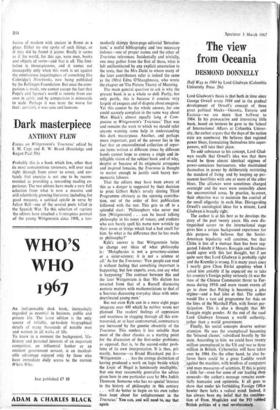Dark masterpiece
ANTHONY FLEW
Essays on Wittgenstein's 'Tractatus' edited by I. M. Copi and R. W. Beard (Routledge and Kegan Paul 50s)
Probably this is a book which few, other than its most conscientious reviewers, will ever read right through from cover to cover, and cer- tainly that exercise is not one to be recom- mended as providing a rewarding reading ex- perience. The two editors have made a very full selection from what is now a massive and still relentlessly growing literature; including, for good measure, a satirical epistle in verse by Julian Bell—one of the several poets killed in the Spanish War. To this selection of reprints the editors have attached a frontispiece portrait of the young Wittgenstein circa 1908, a too-
modestly skimpy three-page editorial 'Introduc- tion,' a useful bibliography and two necessary indexes—one of proper names and the other of Tractatus references. Incidentally and trivially, one may gather from the first of these, what is left unilluminated by any explicit annotation to the texts, that the Mrs Daitz to whom many of the later contributors refer is indeed the same as the (Mrs) Edna O'Shaughnessy, who wrote the chapter on'The Picture Theory of Meaning.
The main general question to ask is why the present book is as a whole so dull. Partly, but only partly, this is because it consists very largely of exegesis and of dispute about exegesis. Yet this cannot be the whole answer, for one could scarcely complain in the same way about Max Black's almost equally lung A Com- panion to Wittgenstein's 'Tractatus.' That was and remains the work to which we should refer anyone wanting some help in understanding this dark masterpiece. Another, and perhaps more important, part of the answer lies in the fact that an uncoordinated collection of separ- ate items written at different times by different hands cannot hope to convey a single and in- telligible vision of the subject book and of why, despite or because of its enigmatic arrogance and inspired lunacies, the Tractatus is thought to matter enough to justify such heavy her- meneutic labours.
That the editors may have been aware of this as a danger is suggested, by their decision to print Gilbert Ryle's tersely shining Third Programme obituary as the opening contribu- tion, out of the order of first publication followed with the rest. This gets us off to a splendid start: 'Philosophers who never met him [Wittgenstein] . . . can be heard talking philosophy in his tones of voices; and students who can barely spell his name now wrinkle up their noses at things which had a bad smell for him. So what is the difference that he has made to philosophy?'
Ryle's answer is that Wittgenstein helps to change our ideas of what philosophy is: 'Metaphysics is not a governess-science or a sister-science; it is not a science at all.' As for the Tractatus: 'Few people can read it without feeling that something important is happening; but few experts, even, can say what is happening.' The contrast between this and the later Wittgenstein is that His diction has reverted from that of a Russell discussing esoteric matters with mathematicians to that of a Socrates discussing everyday ideas with unin- doctrinated young men.'
But not even Ryle can in a mere eight pages integrate over 400 which he neither wrote nor planned. The readers' feelings of oppression and weariness in slogging through all this con- troversial, or at least controverted, commentary are increased by the gnomic obscurity of the Tractatus. This renders it less suitable than most of the clear classics as a starting point for the discussion of the first-order problems; as opposed, that is, to the second-order prob- lems of its own interpretation. It is thus, pri- marily, because—as Brand Blanshard put it— 'Wittgenstein . . . has the strange distinction of having produced a work on logic beside which the Logic of Hegel is luminously intelligible,' that one may reasonably generalise the advice given here in one particular case by Mrs Judith Thomson. Someone who has no special 'interest in the history of philosophy in this century . . will do better to begin on his own rather than hunt about for enlightenment in the Tractatus.' You can, and will need to, say that again.


































 Previous page
Previous page